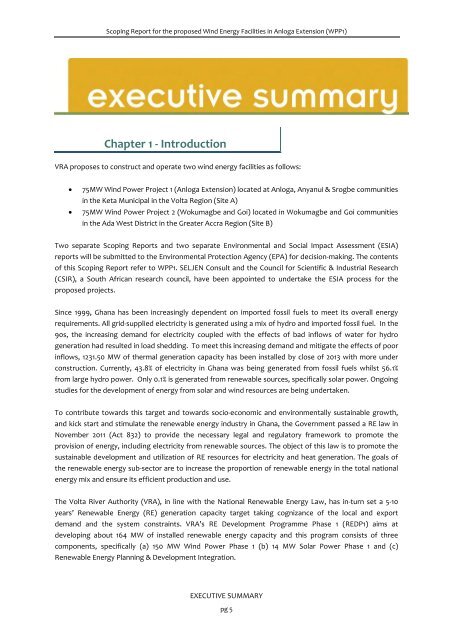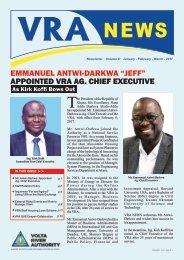SCOPING REPORT
Scoping%20Report%20for%20Wind%20Power%20Project%201
Scoping%20Report%20for%20Wind%20Power%20Project%201
Create successful ePaper yourself
Turn your PDF publications into a flip-book with our unique Google optimized e-Paper software.
Scoping Report for the proposed Wind Energy Facilities in Anloga Extension (WPP1)<br />
Chapter 1 - Introduction<br />
VRA proposes to construct and operate two wind energy facilities as follows:<br />
• 75MW Wind Power Project 1 (Anloga Extension) located at Anloga, Anyanui & Srogbe communities<br />
in the Keta Municipal in the Volta Region (Site A)<br />
• 75MW Wind Power Project 2 (Wokumagbe and Goi) located in Wokumagbe and Goi communities<br />
in the Ada West District in the Greater Accra Region (Site B)<br />
Two separate Scoping Reports and two separate Environmental and Social Impact Assessment (ESIA)<br />
reports will be submitted to the Environmental Protection Agency (EPA) for decision-making. The contents<br />
of this Scoping Report refer to WPP1. SELJEN Consult and the Council for Scientific & Industrial Research<br />
(CSIR), a South African research council, have been appointed to undertake the ESIA process for the<br />
proposed projects.<br />
Since 1999, Ghana has been increasingly dependent on imported fossil fuels to meet its overall energy<br />
requirements. All grid-supplied electricity is generated using a mix of hydro and imported fossil fuel. In the<br />
90s, the increasing demand for electricity coupled with the effects of bad inflows of water for hydro<br />
generation had resulted in load shedding. To meet this increasing demand and mitigate the effects of poor<br />
inflows, 1231.50 MW of thermal generation capacity has been installed by close of 2013 with more under<br />
construction. Currently, 43.8% of electricity in Ghana was being generated from fossil fuels whilst 56.1%<br />
from large hydro power. Only 0.1% is generated from renewable sources, specifically solar power. Ongoing<br />
studies for the development of energy from solar and wind resources are being undertaken.<br />
To contribute towards this target and towards socio-economic and environmentally sustainable growth,<br />
and kick start and stimulate the renewable energy industry in Ghana, the Government passed a RE law in<br />
November 2011 (Act 832) to provide the necessary legal and regulatory framework to promote the<br />
provision of energy, including electricity from renewable sources. The object of this law is to promote the<br />
sustainable development and utilization of RE resources for electricity and heat generation. The goals of<br />
the renewable energy sub-sector are to increase the proportion of renewable energy in the total national<br />
energy mix and ensure its efficient production and use.<br />
The Volta River Authority (VRA), in line with the National Renewable Energy Law, has in-turn set a 5-10<br />
years’ Renewable Energy (RE) generation capacity target taking cognizance of the local and export<br />
demand and the system constraints. VRA’s RE Development Programme Phase 1 (REDP1) aims at<br />
developing about 164 MW of installed renewable energy capacity and this program consists of three<br />
components, specifically (a) 150 MW Wind Power Phase 1 (b) 14 MW Solar Power Phase 1 and (c)<br />
Renewable Energy Planning & Development Integration.<br />
EXECUTIVE SUMMARY<br />
pg 5



